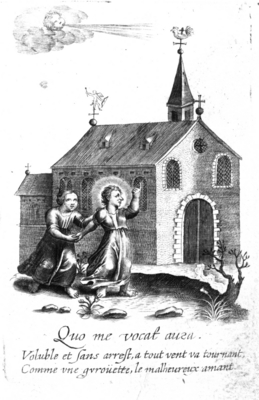Ludovicus van Leuven, Amoris divini et humani antipathia (1629)
Table of contents ↑Inconstantia Amoris [39]

XL.
AMor humanus mutatur pro varietate obie-
ctorum; semper fertur in aliquid noui, quod
sibi tamquam vtile & acceptabile propositum,
appetit. & quemadmodum ipsa obiecta in sese
habent maximas vicissitudines; ita & Amor ma-
xime inconstans est. amas honores? instabiles sunt.
appetis diuitias? fluxæ sunt. optas bonam famam,
fortunam? variabiles sunt. desideras sanitatem?
numquam homo in eodem statu permanet. pro-
caris puellam? amat domicillam? mutabilis est,
varium & mutabile semper fæmina: & tu qui
procaris multo adhuc mutabilior es, audi Poë-
tam,
ctorum; semper fertur in aliquid noui, quod
sibi tamquam vtile & acceptabile propositum,
appetit. & quemadmodum ipsa obiecta in sese
habent maximas vicissitudines; ita & Amor ma-
xime inconstans est. amas honores? instabiles sunt.
appetis diuitias? fluxæ sunt. optas bonam famam,
fortunam? variabiles sunt. desideras sanitatem?
numquam homo in eodem statu permanet. pro-
caris puellam? amat domicillam? mutabilis est,
varium & mutabile semper fæmina: & tu qui
procaris multo adhuc mutabilior es, audi Poë-
tam,

Cat.
Ad dominæ nutum leuis exagitatur amator,
Quoque puella solet vergere, vergit amans:
Non volucris summâ quæ vertitur ænea turre,
Promptius aërias itque, reditque vias.
Rideat illa, mouet tristi miser ore cachinnos;
Ploret, amans lætas proluit imbre genas.
Vos miseros! agimur vacuo ludibria cœlo,
Abripit aura vagos, aura redire iubet.
Ad dominæ nutum leuis exagitatur amator,
Quoque puella solet vergere, vergit amans:
Non volucris summâ quæ vertitur ænea turre,
Promptius aërias itque, reditque vias.
Rideat illa, mouet tristi miser ore cachinnos;
Ploret, amans lætas proluit imbre genas.
Vos miseros! agimur vacuo ludibria cœlo,
Abripit aura vagos, aura redire iubet.

Inconstance de l'Amour.
XXXIX.
Ainsy le cœur humain, qu' vn fol Amour escroule,
Au gréde touts les vents incessament se roule,
Sans esperer iamais de rencontrer le nort;
Telle est la qualitédes choses sublunaires,
Que battant nos esprits de mouuemens contraires,
Le tiennēt dans la mer sans arriuer au port.
XXXIX.
Ainsy le cœur humain, qu' vn fol Amour escroule,
Au gréde touts les vents incessament se roule,
Sans esperer iamais de rencontrer le nort;
Telle est la qualitédes choses sublunaires,
Que battant nos esprits de mouuemens contraires,
Le tiennēt dans la mer sans arriuer au port.
Translations
 |
Inconstancy of love. |
 |
To wherever the wind calls me. |
Sources and parallels
-
The only appearance of a female figure with a nimbus. Same copperplate, slightly altered, in: Liefde zoekt verandering [39]
 (in: Willem den Elger, Zinne-beelden der liefde (1703)
(in: Willem den Elger, Zinne-beelden der liefde (1703) )
[Compare
)
[Compare ]
]
-
Weathercock, partly same motto underneath the pictura, in:Dominae, quo me vocat, aura. [28]
 (in: Jacob Cats, Proteus (1618)
(in: Jacob Cats, Proteus (1618) )
[Compare
)
[Compare ]
]
-
Porteman 1975, p. 212. Weathercock, text in pictura same as motto in: Quod iuvat exiguum est. [19]
 (in: Jacob Cats, Sinne- en minnebeelden (1627)
(in: Jacob Cats, Sinne- en minnebeelden (1627) )
[Compare
)
[Compare ]
]
References, across this site, to this page:
- Dominae, quo me vocat, aura. [28]
 (in: Jacob Cats, Proteus (1618)
(in: Jacob Cats, Proteus (1618) )
)
- Dominae, quo me vocat, aura. [29]
 (in: Jacob Cats, Sinne- en minnebeelden (1627)
(in: Jacob Cats, Sinne- en minnebeelden (1627) )
)
- Liefde zoekt verandering [39]
 (in: Willem den Elger, Zinne-beelden der liefde (1703)
(in: Willem den Elger, Zinne-beelden der liefde (1703) )
)

